[生命中不能承受之轻].(The.Unbearable.Lightness.of.Being).米兰·昆德拉.英文文字版
《生命不能承受之轻》经典语句(中英文都有)
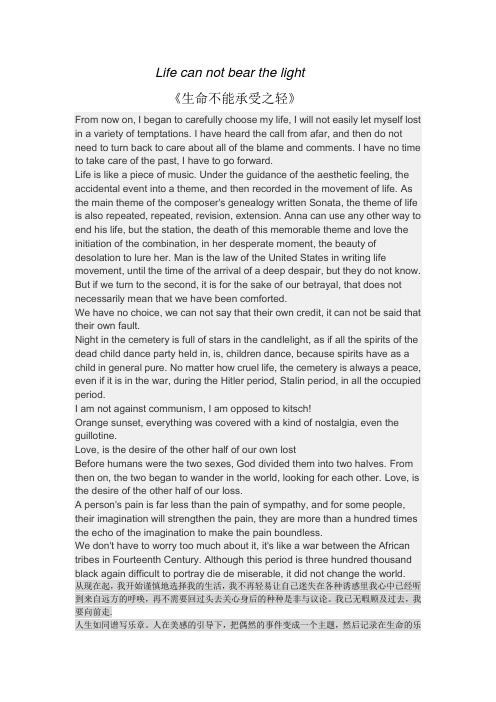
Life can not bear the light《生命不能承受之轻》From now on, I began to carefully choose my life, I will not easily let myself lost in a variety of temptations. I have heard the call from afar, and then do not need to turn back to care about all of the blame and comments. I have no time to take care of the past, I have to go forward.Life is like a piece of music. Under the guidance of the aesthetic feeling, the accidental event into a theme, and then recorded in the movement of life. As the main theme of the composer's genealogy written Sonata, the theme of life is also repeated, repeated, revision, extension. Anna can use any other way to end his life, but the station, the death of this memorable theme and love the initiation of the combination, in her desperate moment, the beauty of desolation to lure her. Man is the law of the United States in writing life movement, until the time of the arrival of a deep despair, but they do not know. But if we turn to the second, it is for the sake of our betrayal, that does not necessarily mean that we have been comforted.We have no choice, we can not say that their own credit, it can not be said that their own fault.Night in the cemetery is full of stars in the candlelight, as if all the spirits of the dead child dance party held in, is, children dance, because spirits have as a child in general pure. No matter how cruel life, the cemetery is always a peace, even if it is in the war, during the Hitler period, Stalin period, in all the occupied period.I am not against communism, I am opposed to kitsch!Orange sunset, everything was covered with a kind of nostalgia, even the guillotine.Love, is the desire of the other half of our own lostBefore humans were the two sexes, God divided them into two halves. From then on, the two began to wander in the world, looking for each other. Love, is the desire of the other half of our loss.A person's pain is far less than the pain of sympathy, and for some people, their imagination will strengthen the pain, they are more than a hundred times the echo of the imagination to make the pain boundless.We don't have to worry too much about it, it's like a war between the African tribes in Fourteenth Century. Although this period is three hundred thousand black again difficult to portray die de miserable, it did not change the world.从现在起,我开始谨慎地选择我的生活,我不再轻易让自己迷失在各种诱惑里我心中已经听到来自远方的呼唤,再不需要回过头去关心身后的种种是非与议论。
生命不能承受之轻豆瓣评分
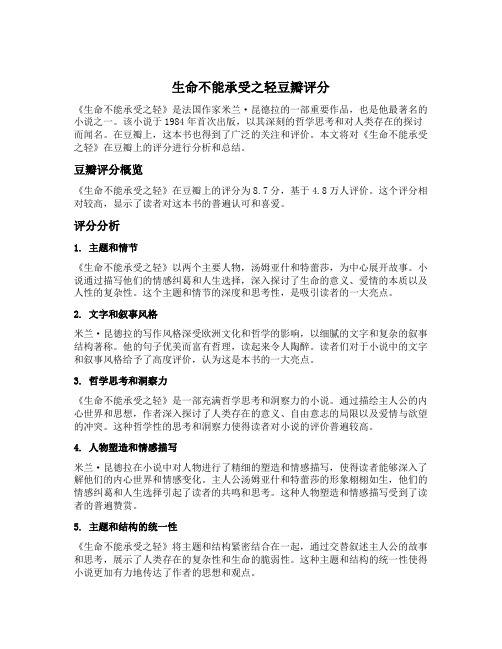
生命不能承受之轻豆瓣评分《生命不能承受之轻》是法国作家米兰·昆德拉的一部重要作品,也是他最著名的小说之一。
该小说于1984年首次出版,以其深刻的哲学思考和对人类存在的探讨而闻名。
在豆瓣上,这本书也得到了广泛的关注和评价。
本文将对《生命不能承受之轻》在豆瓣上的评分进行分析和总结。
豆瓣评分概览《生命不能承受之轻》在豆瓣上的评分为8.7分,基于4.8万人评价。
这个评分相对较高,显示了读者对这本书的普遍认可和喜爱。
评分分析1. 主题和情节《生命不能承受之轻》以两个主要人物,汤姆亚什和特蕾莎,为中心展开故事。
小说通过描写他们的情感纠葛和人生选择,深入探讨了生命的意义、爱情的本质以及人性的复杂性。
这个主题和情节的深度和思考性,是吸引读者的一大亮点。
2. 文字和叙事风格米兰·昆德拉的写作风格深受欧洲文化和哲学的影响,以细腻的文字和复杂的叙事结构著称。
他的句子优美而富有哲理,读起来令人陶醉。
读者们对于小说中的文字和叙事风格给予了高度评价,认为这是本书的一大亮点。
3. 哲学思考和洞察力《生命不能承受之轻》是一部充满哲学思考和洞察力的小说。
通过描绘主人公的内心世界和思想,作者深入探讨了人类存在的意义、自由意志的局限以及爱情与欲望的冲突。
这种哲学性的思考和洞察力使得读者对小说的评价普遍较高。
4. 人物塑造和情感描写米兰·昆德拉在小说中对人物进行了精细的塑造和情感描写,使得读者能够深入了解他们的内心世界和情感变化。
主人公汤姆亚什和特蕾莎的形象栩栩如生,他们的情感纠葛和人生选择引起了读者的共鸣和思考。
这种人物塑造和情感描写受到了读者的普遍赞赏。
5. 主题和结构的统一性《生命不能承受之轻》将主题和结构紧密结合在一起,通过交替叙述主人公的故事和思考,展示了人类存在的复杂性和生命的脆弱性。
这种主题和结构的统一性使得小说更加有力地传达了作者的思想和观点。
读者评价下面是一些读者对《生命不能承受之轻》的评价摘录:•“这本书让我对生命和爱情有了全新的思考,深入探索了人类存在的意义。
生命不能承受之轻

生命不能承受之轻简介《生命不能承受之轻》(The Unbearable Lightness of Being)是捷克作家米兰·昆德拉的一部作品,于1984年出版。
这部小说通过四个主要角色的命运,探讨了人类存在的意义和生活的无常性。
内容概述1. 轻与重的对比小说中,作者提出了“轻”和“重”的概念,这两者代表了两种截然不同的生活态度。
轻意味着无忧无虑,不加思考地过着生活;而重则表示负担重重,压力重重,必须要面对人生的各种困扰和选择。
作者通过展示不同人物的生活经历,比较了这两种态度对人生的影响。
2. 人生的无常性小说中的主要人物托马斯和特蕾莎经历了许多起伏和变化。
他们一开始感到生活轻松愉快,但后来遭受了许多挫折和痛苦。
作者通过描述人生的无常性,揭示了生活中的不确定性和不可预测性。
3. 爱与性的复杂关系故事中的四个主角之间存在着复杂的爱情和性关系。
托马斯与特蕾莎以及其他女性之间的情感纠葛,展示了爱情和性对于个体生命的影响。
作者以此讨论了爱情和性的重要性,以及它们如何改变个体的生活态度和命运。
4. 政治与命运小说的背景设定在1968年的布拉格之春时期,描绘了当时的政治环境和社会氛围。
政治动荡对人们的生活产生了深远的影响,改变了他们的命运和生活方式。
作者通过政治背景的交织,探讨了命运对个体生活的塑造作用。
主要人物角色1. 托马斯(Tomas)托马斯是一位医生,他面临着对特蕾莎和其他女性的情感选择。
他拥有自由、轻松的生活态度,但随着时间的推移,他的生活变得越来越沉重。
2. 特蕾莎(Tereza)特蕾莎是托马斯的妻子,她曾经是位摄影师。
她爱着托马斯,但也受到了他对其他女性的吸引力的伤害。
她在感情和生活上经历了许多挣扎。
3. 萨布拉(Sabina)萨布拉是一个艺术家,她与托马斯有着复杂的情感关系。
她对自由和性的追求使她不断探索自己的生活。
4. 弗朗茨(Franz)弗朗茨是特蕾莎的情人,他是一位教授。
他追求着轻松的生活,但最终面对了自己的挑战和内心的痛苦。
英语散文朗读《生命中不能承受之轻》
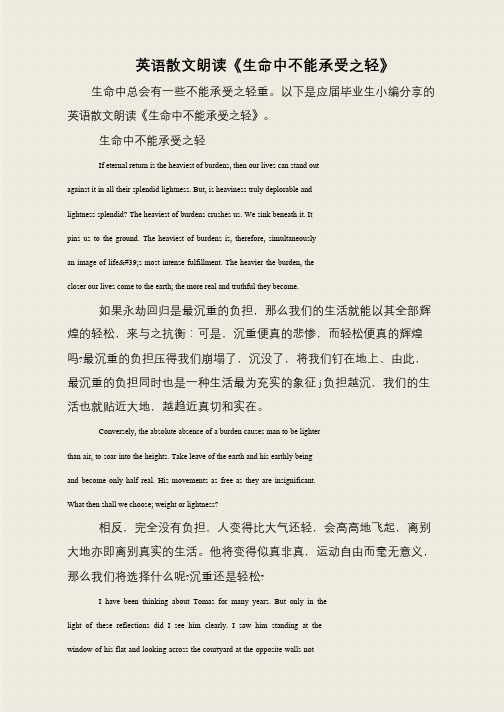
英语散文朗读《生命中不能承受之轻》生命中总会有一些不能承受之轻重。
以下是应届毕业生小编分享的英语散文朗读《生命中不能承受之轻》。
生命中不能承受之轻If eternal return is the heaviest of burdens, then our lives can stand outagainst it in all their splendid lightness. But, is heaviness truly deplorable andlightness splendid? The heaviest of burdens crushes us. We sink beneath it. Itpins us to the ground. The heaviest of burdens is, therefore, simultaneouslyan image of life's most intense fulfillment. The heavier the burden, thecloser our lives come to the earth; the more real and truthful they become.如果永劫回归是最沉重的负担,那么我们的生活就能以其全部辉煌的轻松,来与之抗衡:可是,沉重便真的悲惨,而轻松便真的辉煌吗?最沉重的负担压得我们崩塌了,沉没了,将我们钉在地上、由此,最沉重的负担同时也是一种生活最为充实的象征j 负担越沉,我们的生活也就贴近大地,越趋近真切和实在。
Conversely, the absolute absence of a burden causes man to be lighterthan air, to soar into the heights. Take leave of the earth and his earthly beingand become only half real. His movements as free as they are insignificant.What then shall we choose; weight or lightness?相反,完全没有负担,人变得比大气还轻,会高高地飞起,离别大地亦即离别真实的生活。
《不能承受的生命之轻》经典语录精选
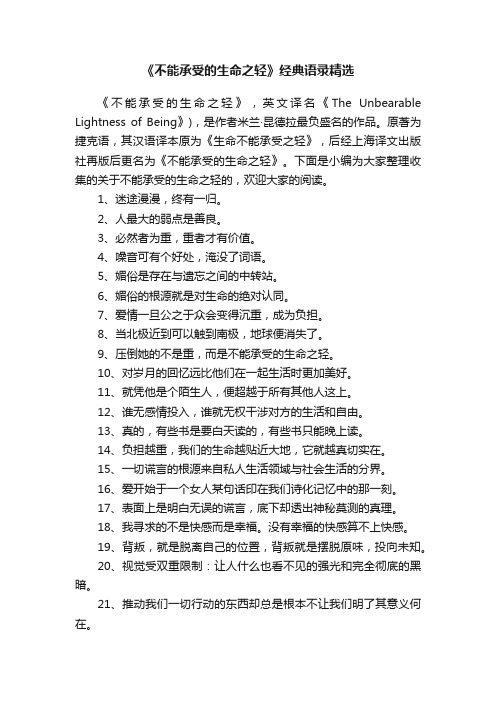
《不能承受的生命之轻》经典语录精选《不能承受的生命之轻》,英文译名《The Unbearable Lightness of Being》),是作者米兰·昆德拉最负盛名的作品。
原著为捷克语,其汉语译本原为《生命不能承受之轻》,后经上海译文出版社再版后更名为《不能承受的生命之轻》。
下面是小编为大家整理收集的关于不能承受的生命之轻的,欢迎大家的阅读。
1、迷途漫漫,终有一归。
2、人最大的弱点是善良。
3、必然者为重,重者才有价值。
4、噪音可有个好处,淹没了词语。
5、媚俗是存在与遗忘之间的中转站。
6、媚俗的根源就是对生命的绝对认同。
7、爱情一旦公之于众会变得沉重,成为负担。
8、当北极近到可以触到南极,地球便消失了。
9、压倒她的不是重,而是不能承受的生命之轻。
10、对岁月的回忆远比他们在一起生活时更加美好。
11、就凭他是个陌生人,便超越于所有其他人这上。
12、谁无感情投入,谁就无权干涉对方的生活和自由。
13、真的,有些书是要白天读的,有些书只能晚上读。
14、负担越重,我们的生命越贴近大地,它就越真切实在。
15、一切谎言的根源来自私人生活领域与社会生活的分界。
16、爱开始于一个女人某句话印在我们诗化记忆中的那一刻。
17、表面上是明白无误的谎言,底下却透出神秘莫测的真理。
18、我寻求的不是快感而是幸福。
没有幸福的快感算不上快感。
19、背叛,就是脱离自己的位置,背叛就是摆脱原味,投向未知。
20、视觉受双重限制:让人什么也看不见的强光和完全彻底的黑暗。
21、推动我们一切行动的东西却总是根本不让我们明了其意义何在。
22、我喜欢你的原因是你毫不媚俗。
在媚俗的王国里,你是个魔鬼。
23、在永恒轮回的世界里,一举一动都承受着不能承受的责任重负。
24、令她反感的,远不是世界的丑陋,而是这个世界所戴的漂亮面具。
25、在这个世界上,一切都预先被谅解了,一切也就被卑鄙地许可了。
26、经文循环往复,犹如朝圣者的双眼离不开故土,犹如临终者不忍离世。
诺贝尔文学奖热门作品

诺贝尔文学奖热门作品
诺贝尔文学奖评选的是对世界文学有重大贡献的作品,每年都会有不同的作品被视为热门候选。
•以下是一些近年来备受关注的诺贝尔文学奖热门作品:
1.《百年孤独》(One Hundred Years of Solitude):这是哥伦比亚作家加西
亚·马尔克斯的代表作之一,以其独特的魔幻现实主义风格和深刻的社会
洞察而广受赞誉。
2.《追风筝的人》(The Kite Runner):这是美国作家卡勒德·胡赛尼的小说,
讲述了一个关于友谊、背叛和救赎的感人故事,深受全球读者喜爱。
3.《生命中不能承受之轻》(The Unbearable Lightness of Being):这是捷克
作家米兰·昆德拉的小说,以其深邃的哲学思考和独特的叙事风格而广受
赞誉。
4.《荒原狼》(The Steppe Wolf):这是德国作家赫尔曼·黑塞的小说,以其
对人性、孤独和自由的深刻探讨而备受推崇。
5.《我的名字叫红》(My Name Is Red):这是土耳其作家奥尔罕·帕慕克的
小说,以其独特的叙事风格和对土耳其历史和文化的深入探讨而广受好评。
需要注意的是,诺贝尔文学奖的评选标准非常严格,每年都会有不同的作品被视为热门候选,但最终获奖的作品往往都是具有独特艺术价值和深刻社会意义的作品。
因此,虽然以上作品备受关注,但最终是否能够获奖还需要经过评委的严格评选。
生命中不能承受之轻读后感
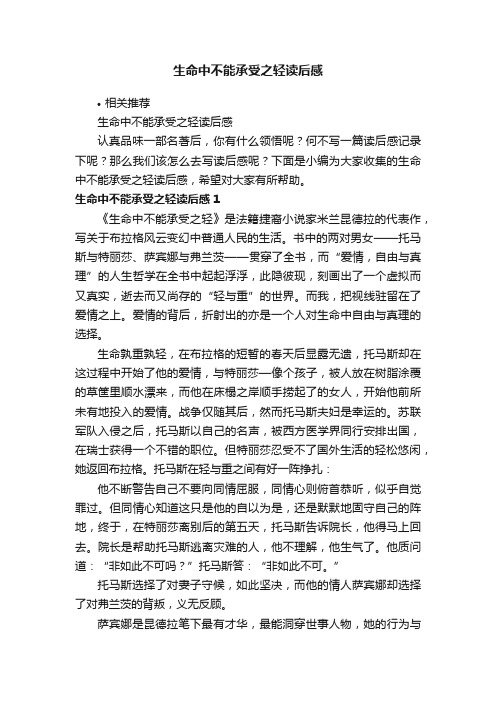
生命中不能承受之轻读后感•相关推荐生命中不能承受之轻读后感认真品味一部名著后,你有什么领悟呢?何不写一篇读后感记录下呢?那么我们该怎么去写读后感呢?下面是小编为大家收集的生命中不能承受之轻读后感,希望对大家有所帮助。
生命中不能承受之轻读后感1《生命中不能承受之轻》是法籍捷裔小说家米兰昆德拉的代表作,写关于布拉格风云变幻中普通人民的生活。
书中的两对男女——托马斯与特丽莎、萨宾娜与弗兰茨——贯穿了全书,而“爱情,自由与真理”的人生哲学在全书中起起浮浮,此隐彼现,刻画出了一个虚拟而又真实,逝去而又尚存的“轻与重”的世界。
而我,把视线驻留在了爱情之上。
爱情的背后,折射出的亦是一个人对生命中自由与真理的选择。
生命孰重孰轻,在布拉格的短暂的春天后显露无遗,托马斯却在这过程中开始了他的爱情,与特丽莎—像个孩子,被人放在树脂涂覆的草筐里顺水漂来,而他在床榻之岸顺手捞起了的女人,开始他前所未有地投入的爱情。
战争仅随其后,然而托马斯夫妇是幸运的。
苏联军队入侵之后,托马斯以自己的名声,被西方医学界同行安排出国,在瑞士获得一个不错的职位。
但特丽莎忍受不了国外生活的轻松悠闲,她返回布拉格。
托马斯在轻与重之间有好一阵挣扎:他不断警告自己不要向同情屈服,同情心则俯首恭听,似乎自觉罪过。
但同情心知道这只是他的自以为是,还是默默地固守自己的阵地,终于,在特丽莎离别后的第五天,托马斯告诉院长,他得马上回去。
院长是帮助托马斯逃离灾难的人,他不理解,他生气了。
他质问道:“非如此不可吗?”托马斯答:“非如此不可。
”托马斯选择了对妻子守候,如此坚决,而他的情人萨宾娜却选择了对弗兰茨的背叛,义无反顾。
萨宾娜是昆德拉笔下最有才华,最能洞穿世事人物,她的行为与爱情似乎是参透“生命中不能承受之轻”谜样的“轻”的箴言。
萨宾娜是背叛的象征和符号。
背叛使她能够直面人生,沉重的人生,在她这里也变得轻盈。
而弗兰茨,却成为相反的另一面,成为被萨宾娜背叛得最厉害的人物,而且得不到同情。
《不能承受的生命之轻》简介资料

《不能承受的生命之轻》简介资料《不能承受的生命之轻》(《LE INSOUTENABLE LEGERETE DE L’ETRE》。
英文译名《The Unbearable Lightness of Being》),是作者米兰·昆德拉最负盛名的作品。
小说描写了托马斯与特丽莎、萨丽娜之间的感情生活。
但它不是一个男人和两个女人的三角性爱故事,它是一部哲理小说,小说从”永恒轮回”的讨论开始,把读者带入了对一系列问题的思考中,比如轻与重、灵与肉。
内容简介本书描述一九六八年苏俄入侵捷克时期,民主改革的气息演变成专横压榨之风潮,本书剖示隐密的无情,探讨爱的真谛,涵盖了男女之爱、朋友之爱、祖国之爱。
在任何欲望之下,每个人对于各类型的爱皆有自由抉择的权利,自应负起诚恳执着的义务。
人生责任是一个沉重的负担,却也是最真切实在的,解脱了负担,人变得比大气还年轻,以真而非,一切将变得毫无意义。
本书探讨更多的是人生的意义所在,人生是要有一种信念的,不能被交给机遇和偶然,甚至是一种媚俗。
小说中的男主人公托马斯是一个外科医生,因为婚姻失败,既渴望女人又畏惧女人,因此发展出一套外遇守则来应付他众多的情妇。
有一天他爱上一个餐厅的女侍--特丽莎,他对她的爱违反了他制定的原则,甚至娶她为妻,但是托马斯灵肉分离的想法丝毫没有改变,依然游移在情妇之间,对全心爱他的特丽莎是一种伤害。
特丽莎经常在极度不安的梦靥中醒来,经常猜忌与怀有恐怖想象。
此时捷克政治动乱不安,在苏黎世一位权威医生希望托马斯去那里发展的呼唤下,两人于是决定去那里生活。
但是面对陌生环境的不安与丈夫仍然与情妇私通,特丽莎决定离开,回到祖国。
但是命运与抉择让托马斯回去找她,此后两人没有再分离。
他们意识到在一起是快乐的,是折磨与悲凉里的快乐,彼此是生命中甜美的负担。
后来他们死于一场车祸。
萨宾娜是一个画家,曾经是托马斯的情妇之一,也是特丽莎妒忌的对象。
萨宾娜一生不断选择背叛,选择让自己的人生没有责任而轻盈的生活。
- 1、下载文档前请自行甄别文档内容的完整性,平台不提供额外的编辑、内容补充、找答案等附加服务。
- 2、"仅部分预览"的文档,不可在线预览部分如存在完整性等问题,可反馈申请退款(可完整预览的文档不适用该条件!)。
- 3、如文档侵犯您的权益,请联系客服反馈,我们会尽快为您处理(人工客服工作时间:9:00-18:30)。
MILAN KUNDERAThe Unbearable Lightness of BeingTranslated from the Czech by Michael Henry HeimPART ONE PART TWO PART THREE PART FOUR PART FIVE PART SIX LIGHTNESS AND WEIGHT SOUL AND BODY WORDS MISUNDERSTAND SOUL AND BODY LIGHTNESS AND WEIGHT THE GRAND MARCH KARENIN’S SMILEPART SEVENPART ONELightness and Weight1The idea of eternal return is a mysterious one, and Nietzsche has often perplexed other philosophers with it: to think that everything recurs as we once experienced it, and that the recurrence itself recurs ad infinitum! What does this mad myth signify?Putting it negatively, the myth of eternal return states that a life which disappears once and for all, which does not return, is like a shadow, without weight, dead in advance, and whether it was horrible, beautiful, or sublime, its horror, sublimity, and beauty mean nothing. We need take no more note of it than of a war between two African kingdoms in the fourteenth century, a war that altered nothing in the destiny of the world, even if a hundred thousand blacks perished in excruciating torment.Will the war between two African kingdoms in the fourteenth century itself be altered if it recurs again and again, in eternal return?It will: it will become a solid mass, permanently protuberant, its inanity irreparable.If the French Revolution were to recur eternally, French historians would be less proud of Robespierre. But because they deal with something that will not return, the bloody years of the Revolution have turned into mere words, theories, and discussions, have become lighter than feathers, frightening no one. There is an infinite difference between a Robespierre who occurs only once in history and a Robespierre who eternally returns, chopping off French heads.Let us therefore agree that the idea of eternal return implies a perspective from which things appear other than as we know them: they appear without the mitigating circumstance of their transitory nature. This mitigating circumstance prevents us from coming to a verdict. For how can we condemn something that is ephemeral, in transit? In the sunset of dissolution, everything is illuminated by the aura of nostalgia, even the guillotine.Not long ago, I caught myself experiencing a most incredible sensation. Leafing through a book on Hitler, I was touched by some of his portraits: they reminded me of my childhood. I grew up during the war; several members of my family perished in Hitler's concentration camps; but what were their deaths compared with the memories of a lost period in my life, a period that would never return?This reconciliation with Hitler reveals the profound moral perversity of a world that rests essentially on the nonexistence of return, for in this world everything is pardoned in advance and therefore everything cynically permitted.2If every second of our lives recurs an infinite number of times, we are nailed to eternity as Jesus Christ was nailed to the cross. It is a terrifying prospect. In the world of eternal return the weight of unbearable responsibility lies heavy on every move we make. That is why Nietzsche called the idea of eternal return the heaviest of burdens (das schwerste Gewicht).If eternal return is the heaviest of burdens, then our lives can stand out against it in all their splendid lightness.But is heaviness truly deplorable and lightness splendid?The heaviest of burdens crushes us, we sink beneath it, it pins us to the ground. But in the love poetry of every age, the woman longs to be weighed down by the man's body. The heaviest of burdens is therefore simultaneously an image of life's most intense fulfillment. The heavier the burden, the closer our lives come to the earth, the more real and truthful they become.Conversely, the absolute absence of a burden causes man to be lighter than air, to soar into the heights, take leave of the earth and his earthly being, and become only half real, his movements as free as they are insignificant.What then shall we choose? Weight or lightness?Parmenides posed this very question in the sixth century before Christ. He saw the world divided into pairs of opposites:light/darkness, fineness/coarseness, warmth/cold, being/non-being. One half of the opposition he called positive (light, fineness, warmth, being), the other negative. We might find this division into positive and negative poles childishly simple except for one difficulty: which one is positive, weight or lightness?Parmenides responded: lightness is positive, weight negative.Was he correct or not? That is the question. The only certainty is: the lightness/weight opposition is the most mysterious, most ambiguous of all.3I have been thinking about Tomas for many years. But only in the light of these reflections did I see him clearly. I saw him standing at the window of his flat and looking across the courtyard at the opposite walls, not knowing what to do.He had first met Tereza about three weeks earlier in a small Czech town. They had spent scarcely an hour together. She had accompanied him to the station and waited with him until he boarded the train. Ten days later she paid him a visit. They made love the day she arrived. That night she came down with a fever and stayed a whole week in his flat with the flu.He had come to feel an inexplicable love for this all but complete stranger; she seemed a child to him, a child someone had put in a bulrush basket daubed with pitch and sent downstream for Tomas to fetch at the riverbank of his bed.She stayed with him a week, until she was well again, then went back to her town, some hundred and twenty-five miles from Prague. And then came the time I have just spoken of and see as the key to his life: Standing by the window, he looked out over the courtyard at the walls opposite him and deliberated.Should he call her back to Prague for good? He feared the responsibility. If he invited her to come, then come she would, and offer him up her life.Or should he refrain from approaching her? Then she would remain a waitress in a hotel restaurant of a provincial town and he would never see her again.Did he want her to come or did he not?He looked out over the courtyard at the opposite walls, seeking an answer.He kept recalling her lying on his bed; she reminded him of no one in his former life. She was neither mistress nor wife. She was a child whom he had taken from a bulrush basket that had been daubed with pitch and sent to the riverbank of his bed. She fell asleep. He knelt down next to her. Her feverous breath quickened and she gave out a weak moan. He pressed his face to hers and whispered calming words into her sleep. After a while he felt her breath return to normal and her face rise unconsciously to meet his. He smelled the delicate aroma of her fever and breathed it in, as if trying to glut himself with the intimacy of her body. And all at once he fancied she had been with him for many years and was dying. He had a sudden clear feeling that he would not survive her death. He would lie。
